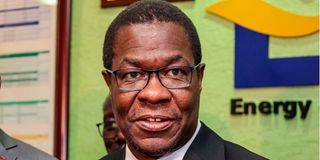Premium
MPs clash with Executive over renewal of costly power deals

Energy Cabinet Secretary Opiyo Wandayi.
What you need to know:
- CS Wandayi said the move will enable the government to contract private firms to build power generation plants to increase the country’s generation capacity even as demand grows.
- The State’s push, however, is set to face stiff opposition from MPs who are demanding strict regulation of IPPs as well as greater transparency before signing the deals.
A major clash is looming between the Executive and MPs over fresh plans to renew costly electricity deals with independent power producers (IPPs) with lawmakers opposed to the push by the Executive to lift the ban on signing of new power deals.
The latest development comes after Energy Cabinet Secretary, Opiyo Wandayi, hinted at the national government lifting a ban by Parliament on signing new Power Purchase Agreements (PPAs) to help unlock new electricity generation plants amid thinning reserves.
CS Wandayi said the move will enable the government to contract private firms to build power generation plants to increase the country’s generation capacity even as demand grows.
The State’s push, however, is set to face stiff opposition from MPs who are demanding strict regulation of IPPs as well as greater transparency before signing the deals.
Currently, a moratorium has been imposed by Parliament on the signing of new PPAs with MPs raising concerns over the skewed nature of the deals, which have been blamed for the high cost of electricity in the country, and their longer durations.
The Cabinet had in February last year lifted a moratorium that had been imposed by former President Uhuru Kenyatta’s government.
The moratorium was, however, immediately reinstated by Parliament following a petition by Laikipia Woman Representative Jane Kagiri.
Nairobi Senator Edwin Sifuna said an inquiry into the high cost of electricity in the country by the Senate Energy Committee revealed a general opaqueness in the disclosure of beneficial owners of power-producing companies with a majority of them listing foreign companies as shareholders.
Further, the dispatch of power currently done by Kenya Power is not based on least-cost merit order therefore preference is not given to the cheaper power producers.
To cure the identified gaps, he said the legislators have proposed a raft of amendments to the Energy Act.
Senator Sifuna said one of the amendments will require that before signing a power purchase deal, a feasibility study must be conducted to identify whether there is enough demand for electricity purchase that cannot be met by the existing production.
Kenya Power will also be compelled to dispatch power based on the merit order giving preference to the cheaper power producers.
“It does not make sense that you have cheaper, available power yet the person who is responsible for dispatching electricity at Kenya Power decides to go for more expensive sources of electricity such as thermal generators,” The senate deputy minority whip said.
Kiambu Senator Karungo Thang’wa said the reason Kenyans have higher electricity charges is because Kenya Power gets into contracts even when they do not need them.
“This Bill will cure that as it calls for feasibility studies before any contract is entered into to ask whether such power is needed or not. This will prevent Kenyans from paying higher or exaggerated bills. The amendments will bring about transparency and accountability,” he said.
The MPs also want Kenya Power to only award a power purchase deal to an entity that has fully disclosed its beneficial owners to remove opaqueness in such deals.
“It should be the standard practice. If you have something to hide, then we should not be doing business with you. You should be able to tell us outright who the owners of the company are. Many of the IPPs that hold PPA as we speak today have not fully disclosed their ownership. It was a struggle for us to get to know the beneficial owners of some of these companies,” he said.
Vihiga Senator Godfrey Osotsi said one of the contributors to the high cost of power in the country is these expensive and secretive PPAs between the government and some IPPs.
He said it is not right that a government institution can agree with individuals or private institutions without the knowledge of Kenyans, adding that all agreements must now be subjected to Parliamentary approval so that the public interest is protected.
“The amendments will help us unlock the problem that existed in the country for many years. It will ensure the IPPs are known. We must know who these companies are, the faces behind them, and what the agreements say,” he said.
Nandi Senator Samson Cherargei added: “We are yet to be informed of the outcome of a report that called for the renegotiation of the PPAs by the IPPs, whether the deals have been cancelled.”
They also want the process of procurement of electrical energy to comply with procedures set out in the Public Procurement and Disposal Act and also have a register of all the PPAs entered into which must be published on its website as well as the annual audit reports of the purchasing entity.
“As a committee, we were very shocked to find out that we don’t know as a country how many of the PPAs exist people are sitting on them quietly and we are paying for capacity charges for things we are not aware where they exist or where they are generating from,” said Mr Sifuna.
Migori Senator Eddy Oketch claimed that Kenya Power has signed over 45 PPAs yet the information to the public about the agreements is scanty and unavailable.
“Kenya Power does not want to allow the public to interact with the cost structure of the agreements. The details are hidden from the public.”





